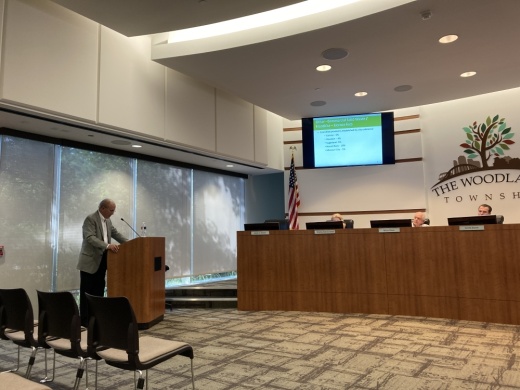Assumptions for the future of the municipal utility districts cannot be made before incorporation, because a future elected government would have to make that decision, board Chair Gordy Bunch said.
Water and sewer utilities in The Woodlands are served by a total of 11 municipal utility districts that provide direct water and sewer utilities to customers but do not own treatment, distribution or collection facilities. Those are owned by the San Jacinto River Authority or by Harris-Montgomery County MUD No. 387, according to the presentation. Municipal utility districts in The Woodlands serve about 37,000 single-family customers.
Consolidating the MUDs in an incorporation scenario has been one of the more complex issues in the study, officials have said, because of the differences among the various districts' debt service and tax rates as well as the fact that the shape of the services would need to be made by a future governing body.
Don Norrell, the former general manager of The Woodlands Township who retired last summer, presented information on the various possible MUD scenarios at the meeting.
He said if incorporation were to be approved by township voters, a new city would have several options, one of which would be to maintain the status quo and keep the MUDs in their approximate current state.
A second option would be for a new city to abolish the utility operations and assume them. This would provide some financial benefits, Norrell said, because it would decrease operational and administrative costs and bring them under one umbrella.
Because existing MUDs range dramatically in their debts and their tax rates, another solution could consist of consolidating all of the debt and sharing it among all utility users. The issue with that would be that some people currently not paying taxes on MUD debt would see a new tax cost, Norrell said.
The third option would be an interlocal agreement with MUDs to allow the city to assume operations, but the MUDs would continue to levy tax for debt service until the debt was paid off.
During the public comment portion of the subsequent regular township meeting, Kent Maggert, a former member of the MUD 36 board, said he has advocated consolidating the MUDs for some time.
“Most people don’t realize the MUDs are pretty powerful; they are effectively a zoning agency,” Maggert said.
He said while most MUDs do not take advantage of that authority, they can refuse water and service to developments. He also told the board to be mindful of the need for drainage in developing water and sewer plans, and that is also part of the scope of MUD responsibilities.
No decisions relating to the incorporation study or a future vote were made at the June 17 meetings. In order for incorporation to take place, an election would need to be called, and voters would need to approve the measure.





